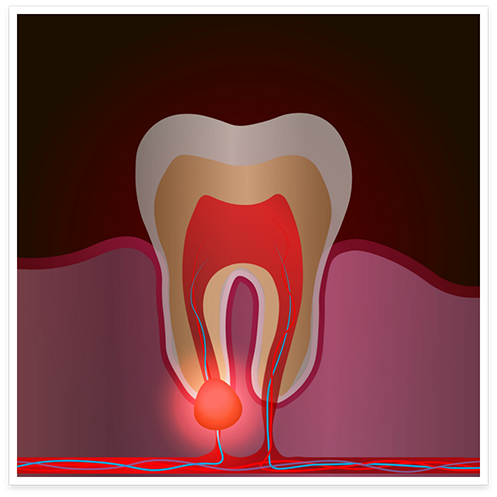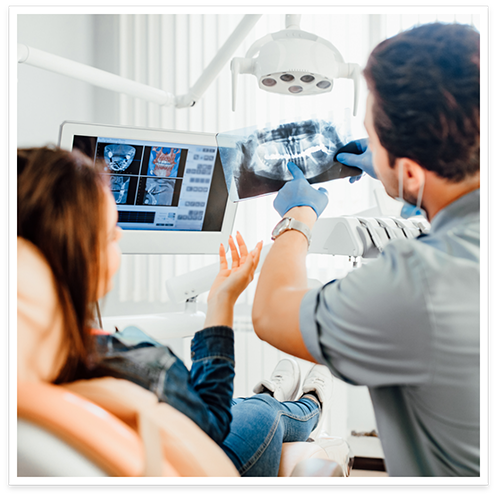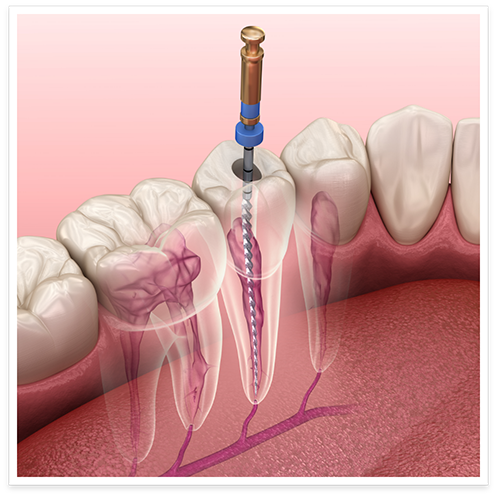Root Canal Treatment Leesburg
Eliminate Infection and Save Your Tooth

When a tooth becomes infected, at some point it might need to be extracted in order to protect your overall health. Luckily, Dr. Pham can save your tooth by performing root canal therapy. This procedure is performed to remove infected or diseased pulp along with any bacteria inside your tooth. Afterward, the area is resealed to prevent the infection from returning. Many patients believe that root canal therapy is exceptionally painful, but at Downtown Family Dental of Leesburg, we’ll use modern techniques and technologies to make your experience as comfortable as possible. If you think you might need a root canal, call us today!
Why Choose Downtown Family Dental of Leesburg for Root Canal Therapy?
- Nitrous Oxide and Oral Conscious Sedation Available
- Highly Trained and Experienced Dentists
- Comfortable, Welcoming Environment
Why are My Teeth Infected?

The tooth contains a mass of blood vessels, lymphs, and nerve tissues collectively called the pulp. The pulp is responsible for nourishing the tooth and getting rid of waste. Under normal circumstances, the pulp is protected by the tooth’s two outer layers: the extremely hard enamel that’s visible on the surface and the slightly softer dentin that’s underneath. However, there are many ways your tooth’s defenses could be compromised. The enamel could be broken due to a blow to the mouth or another type of trauma, or a cavity could form as a result of poor oral hygiene. In any case, when the enamel and dentin have been damaged, the bacteria in your mouth could reach the pulp – and at that point, your tooth is already at risk.
How Do You Know If a Tooth Is Infected?

One of the most obvious signs of an infection is the severe pain that occurs when the bacteria in the pulp attack the nerves. You might notice that the pain gets worse whenever you’re biting or chewing with the affected tooth. Other warning signs include increased sensitivity (feeling pain whenever the tooth is exposed to hot or cold), small sores on the gums, swollen cheeks, and fever. Sometimes you might not realize a tooth is infected until it’s too late. Fortunately, regular dental checkups and X-rays can allow us to identify the problem early on.
What is the Root Canal Procedure?

First, it’s important to realize that multiple steps (including the use of anesthesia and advanced dental technology) will be taken to keep you comfortable and relaxed during your root canal therapy. Many people find that the procedure is actually no more painful than having a cavity filled.
During the actual procedure, Dr. Pham will make a small access hole in the tooth. The pulp will be removed through the hole, and any remaining bacteria or debris will be removed during a thorough disinfection. Once that’s done, the tooth is filled with an inert substance before being resealed; the final step will be to place a porcelain crown so that the tooth can continue to function normally.
A fully erupted tooth can survive without the pulp or any of the blood vessels and nerve tissues it contains. In the end, removing the source of infection will stop your discomfort and allow you to preserve your tooth.
Understanding the Cost of Root Canals

The cost of a root canal in Leesburg can vary for each patient. It depends on the complexity and severity of the case at hand. Our team will be sure to provide you with an honest price estimate before we start to work on your smile. Rest assured that even though this procedure can be costly, it is a wise investment in your oral health because the priority should always be to preserve your natural teeth when possible.
Factors That Can Affect Root Canal Cost

When you come in for your appointment with your emergency dentist in Leesburg, we will examine your mouth before providing a cost estimate for your root canal. Some factors that could influence its pricing are:
- The type or location of the tooth. Incisors generally range from $300-1,000. Premolars are usually in the range of $400-1,800 as compared to $500-2,000 for molars. Pricing is directly related to how involved the treatment is – molars have multiple roots while incisors only have one.
- The complexity of the case. Depending on the difficulty of the procedure, it might be necessary to involve a specialist. They may operate under a different price structure than we do.
- Additional services are involved. For example, a dental crown may be recommended to help protect and fully restore your tooth. A crown means an additional expense, and the cost will depend on the type of tooth.
Is It Cheaper to Pull My Tooth?

If money is tight, you might be tempted to go for a tooth extraction instead of root canal therapy. It is true that in the near term, removing a tooth is less expensive than preserving it. However, a root canal can certainly be more affordable in the long run. Not only can it spare you from having to pay for tooth replacement but keeping your natural teeth can also prevent future dental issues that would incur further expenses.
The longer you wait to get a root canal, the more likely it is your tooth will have to be removed. Then, concerns about your bite being impacted to cause discomfort and difficulty eating enter the picture.
Does Dental Insurance Cover Root Canal Therapy?

Most dental insurance plans do cover root canal therapy. It is usually classified as a major procedure, meaning that 50-80 percent of the cost may be covered up to the amount of your plan’s annual maximum. You will need to examine your policy’s details to know for sure how it applies.
Our practice welcomes insurance. We will be happy to verify your coverage, file your claims paperwork, and help you understand your benefits.
Other Options to Make Root Canal Therapy Affordable

Beyond assisting with your insurance, we offer other avenues to make your root canal therapy feasible:
- Wellness Plan: This plan will get you a 20 percent discount on root canal therapy if you select the “Major Care” option, not to mention many other benefits!
- Emergency Visit Offer: If you suspect you may need a root canal, you can get an Emergency Dental Visit including an exam and X-rays for $89. If you do need treatment, it’s important to find out ASAP to potentially save your tooth.
In your time of need, we are ready to help with your root canal therapy. We’ll help you navigate the financial aspect, so don’t hesitate to contact our team with any questions!
When you come in for your appointment with your emergency dentist in Leesburg, we will examine your mouth before providing a cost estimate for your root canal. Some factors that could influence its pricing are:
- The type or location of the tooth. Incisors generally range from $300-1,000. Premolars are usually in the range of $400-1,800 as compared to $500-2,000 for molars. Pricing is directly related to how involved the treatment is – molars have multiple roots while incisors only have one.
- The complexity of the case. Depending on the difficulty of the procedure, it might be necessary to involve a specialist. They may operate under a different price structure than we do.
- Additional services are involved. For example, a dental crown may be recommended to help protect and fully restore your tooth. A crown means an additional expense, and the cost will depend on the type of tooth.
Root Canal FAQs
Why Do I Need a Root Canal If My Tooth Doesn’t Hurt?
Intense tooth pain often leads people to their dentist’s office only to discover they need a root canal. However, just because you don’t feel any tooth pain doesn’t mean that everything is fine. It’s possible your tooth’s nerves have “died” due to trauma or infection without first feeling any discomfort, so your tooth is no longer capable of feeling pain. Biannual dental exams are crucial to allow your dentist to check for any signs of trouble that you may not have noticed.
How Long Do Root Canals Take?
Although root canal therapy can usually be completed in one appointment, it may sometimes require two sessions. During your first visit, our dentist will place a temporary antibacterial medicine inside the tooth to relieve your pain. Then, you’ll return to the office at a later date to have the inside of your tooth cleaned out. In most cases, the procedure will take 30-90 minutes. Of course, the amount of time varies depending on the location of the tooth. Molars have more root canals that must be disinfected than front teeth, so root canal therapy for back teeth usually takes more time.
Are Root Canals Safe?
Faulty research conducted almost a century ago led to persistent rumors claiming root canals are unsafe and increase your risk of various medical conditions. However, the American Association of Endodontists (AAE) has thoroughly debunked this idea. Root canal therapy performed by a qualified dentist in Leesburg is quite safe with a success rate of about 95 percent. As with any medical procedure, there is a very small chance of some bacteria remaining in the tooth after a root canal and causing reinfection. It’s important to play it safe, so be sure to let your dentist know if you experience intense swelling, pain, or fever in the days after your root canal.
How Long Does It Take to Recover from a Root Canal?
Even though the recovery time is different for everyone, most patients can return to their usual activities the day after their root canal. Keep in mind that strenuous exercise can divert blood from the site and delay the healing process. That said, if your job requires physical labor, it’s best to take the next 2-3 days off. Your mouth will also feel sore in the first few days after your procedure. Fortunately, you can manage your discomfort by taking over-the-counter pain medication and using a cold compress. While you heal, make sure you avoid chewing on the side of your mouth where the root canal occurred.
Do Root Canals Hurt?
Of course, this list of FAQs would ultimately be incomplete without this question. If you’ve been wondering about this, we have good news: root canals in Leesburg are virtually painless thanks to numbing agents, cutting-edge technology, and advancements in dentistry. In fact, many patients share that the treatment process is no more cumbersome than a standard filling!
Can I Eat Before My Root Canal?
Usually, patients are given the green light to eat a healthy, well-balanced meal before the procedure. That said, there are some exceptions. For example, if you’re being sedated, we may ask you to fast in the hours leading up to your appointment to prevent feelings of nausea. If you’re unsure if you should eat something beforehand, don’t hesitate to reach out to Dr. Pham!
Do Root Canals Make You Sick?
The misconception that they do originates from poorly designed research conducted back in the 1920s. The truth is that the original findings have been disproven several times, so there isn’t any scientific evidence supporting the claim that root canals lead to illness. In fact, NOT getting the restorative care you need can cause the infection to spread, negatively impacting your oral and overall health in the process.
Can Root Canals Be Prevented?
Many common oral health problems can be prevented, including large cavities. If you want to keep your smile decay and infection-free, it’s of the utmost importance that you commit to a solid oral hygiene regimen at home and schedule a dental checkup and cleaning twice a year. In addition to that, do your best to wear a mouthguard during sports, eat nutrient-dense, well-balanced meals, and avoid tobacco products.
What Happens If I Don’t Get a Root Canal?
Sometimes, patients assume that their situation isn’t that urgent, especially if their tooth doesn’t hurt. The reality is that the infection can continue to progress if left untreated, negatively impacting your oral and overall health in the process. Plus, there will come a time when a root canal is no longer an option; an extraction will be needed. Although we offer lifelike, durable, and long-lasting tooth-replacement options, like dental implants, there’s truly nothing like your natural teeth, which is why we recommend getting the restorative care you need sooner rather than later.
I Am Scared of the Dentist. What Should I Do?
To this day, root canals are one of the most feared procedures. So, if you are struggling with anxiety surrounding your visit, you’re not alone. The good news is that we’re here to help! For many patients, just knowing what to expect can help tremendously. For others, adding dental sedation to their treatment plan is necessary. We’re proud to offer both nitrous oxide and oral conscious sedation to ensure the entire experience is calm and comfortable, even for patients who experience considerable nerves, stress, and worry.
I Need a Checkup & Cleaning I am Worried About Gum Disease I Need a Dentist for My Child I Have a Cavity or Broken Tooth I am Missing One or More Teeth I Want to Enhance My Smile I Want a Straighter Smile I am Scared of the Dentist I Have a Dental Emergency I Have Sleep Apnea or Snore I Have Jaw Pain & Headaches View Our Services




